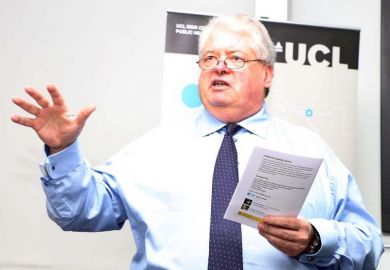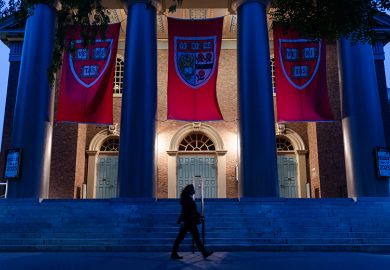The past few months have been terrible for concrete’s reputation but UCL’s new Marshgate building – a veritable palace of the stuff – certainly looks as though it has been built to last.
Looming over the River Lea and competing for space in the rapidly changing Olympic Park skyline with Sir Anish Kapoor’s spiralling ArcelorMittal Orbit, the building is one of two that comprises the new UCL East campus, billed as the biggest expansion in the university’s near 200-year history.
The antithesis of UCL’s constricted, historic base in Bloomsbury, Marshgate has a big, cavernous atrium, overlooked by eight floors and a giant, glowing model of Planet Earth that hangs from a huge open ceiling.
Big, expensive capital projects are often criticised in higher education but, done well, they can be an opportunity to change what a university does and UCL’s ambitions for the new campus match its immense stature.
At a launch event, UCL president Michael Spence spoke of academia having always been about “dissecting the world into little boxes so we could master it” and then telling people what they should think about things they “weren’t really interested in in the first place”.
UCL has, for some time, been working in a totally opposite direction, said Dr Spence, and the new building “wants to put this thinking at the centre of the university”.
For others the project has raised more practical, but no less important, questions about the future of higher education; namely how big can a university realistically get without putting a strain on its identity and finances?
UCL was already the UK’s second biggest institution by student numbers and UCL East has added nine new undergraduate degree programmes and 47 postgraduate taught programmes.
Justine Simons, London’s deputy mayor for culture, said, along with the opening of the new London College of Fashion building as part of the same East Bank development, 10,000 students will soon be studying on the park, adding to its complete transformation since the 2012 games.
With the BBC and Victoria & Albert Museum also moving in nearby, Ms Simons emphasised the opportunities for collaborations and connections between universities and the creative industries.
UCL is also recruiting 260 new academics to work in the building and more than 700 professional services support staff. Twelve new schools and centres are opening, including the Global Business School for Health, the Institute of Making and the Manufacturing Futures Lab.
These will be the bedrock of the campus’ multidisciplinary approach, said pro provost Paola Lettieri. With no departments, the centres are intended to accommodate experts from all disciplines, where materials scientists can work alongside art conservationists, for example.
Spaces have been designed so people can be “nosy”, she added, and in a way that “naturally brings people together”. It is hoped this will speed up the process of fostering scientific breakthroughs – so often dependent on luck and chance – and translating them into real-world uses.
“We couldn’t do this in Bloomsbury because we have run out of space, literally,” Professor Lettieri said.
“Bloomsbury is an amazing campus, but it is 200 years old and has limitations of the architecture and buildings that we occupy. They are gorgeous but not designed for the kind of spontaneous collaboration we want to create at UCL East.”
Designing a collaborative building is one thing but centuries-old academic boundaries are not so easily destroyed, admitted Professor Lettieri.
“I feel like I’ve learned to speak many different languages working with academics that come from different disciplines,” she said. “We have done a lot but clearly, we’ve got to continue to build more bridges.”
UCL East will not operate in a silo either, with students and staff encouraged to work across both sites.
Arun Sharma, who has just finished an archaeology master’s, said there was much to be gained from operating in two different worlds.
“Bloomsbury is very embedded in London and that area’s intellectual history,” he said. “It has got the prestige with it but also limitations.
“You can step out of the gate and are swept off your feet by buses, cars and taxi drivers. It is part of a very fast-paced London environment.
“It feels a bit transient; there are all these lovely opportunities but they come and go very quickly. Unless you can utilise it, it can be a bit overwhelming.
“Here, you’ve got the nature, the wonderful facilities, the different universities popping up everywhere”, Mr Sharma continued.
“It’s an environment that has only developed in the last 10 to 15 years, so it feels like a new slate. It’s really important for people not to feel constrained by the weight of the past.”
Register to continue
Why register?
- Registration is free and only takes a moment
- Once registered, you can read 3 articles a month
- Sign up for our newsletter
Subscribe
Or subscribe for unlimited access to:
- Unlimited access to news, views, insights & reviews
- Digital editions
- Digital access to THE’s university and college rankings analysis
Already registered or a current subscriber?








